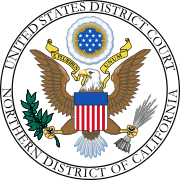The Communications Decency Act of 1996 (CDA) was the United States Congress's first notable attempt to regulate pornographic material on the Internet. In the 1997 landmark case Reno v. ACLU, the United States Supreme Court unanimously struck the act's anti-indecency provisions.

Carafano v. Metrosplash.com, Inc., 339 F.3d 1119, is an American legal case dealing with the protection provided an internet service provider under the Communications Decency Act (CDA) United States Code Title 47 section 230(c)(1). It is also known as the Star Trek actress case as the plaintiff, Chase Masterson – whose legal name is Christianne Carafano – is well known for having appeared on Star Trek: Deep Space Nine. The case demonstrated that the use of an online form with some multiple choice selections does not override the protections against liability for the actions of users or anonymous members of a Web-based service.
Online service provider law is a summary and case law tracking page for laws, legal decisions and issues relating to online service providers (OSPs), like the Wikipedia and Internet service providers, from the viewpoint of an OSP considering its liability and customer service issues. See Cyber law for broader coverage of the law of cyberspace.

Cubby, Inc. v. CompuServe Inc., 776 F. Supp. 135 was a 1991 court decision in the United States District Court for the Southern District of New York which held that Internet service providers were subject to traditional defamation law for their hosted content. The case resolved a claim of libel against CompuServe, an Internet service provider that hosted allegedly defamatory content in one of its forums. The case established a precedent for Internet service provider liability by applying defamation law, originally intended for hard copies of written works, to the Internet medium. The court held that although CompuServe did host defamatory content on its forums, CompuServe was merely a distributor, rather than a publisher, of the content. As a distributor, CompuServe could only be held liable for defamation if it knew, or had reason to know, of the defamatory nature of the content. As CompuServe had made no effort to review the large volume of content on its forums, it could not be held liable for the defamatory content.

Google Ads is an online advertising platform developed by Google, where advertisers bid to display brief advertisements, service offerings, product listings, or videos to web users. It can place ads both in the results of search engines like Google Search and on non-search websites, mobile apps, and videos. Services are offered under a pay-per-click (PPC) pricing model.
Click fraud is a type of fraud that occurs on the Internet in pay-per-click (PPC) online advertising. In this type of advertising, the owners of websites that post the ads are paid based on how many site visitors click on the ads. Fraud occurs when a person, automated script, computer program or an auto clicker imitates a legitimate user of a web browser, clicking on such an ad without having an actual interest in the target of the ad's link in order to increase revenue. Click fraud is the subject of some controversy and increasing litigation due to the advertising networks being a key beneficiary of the fraud.
Pay-per-click (PPC) is an internet advertising model used to drive traffic to websites, in which an advertiser pays a publisher when the ad is clicked.

Zeran v. America Online, Inc., 129 F.3d 327, cert. denied, 524 U.S. 937 (1998), is a case in which the United States Court of Appeals for the Fourth Circuit determined the immunity of Internet service providers for wrongs committed by their users under Section 230 of the Communications Decency Act (CDA). Section 230(c)(1) of the CDA provides that "No provider or user of an interactive computer service shall be treated as the publisher or speaker of any information provided by another information content provider."
Search engine marketing (SEM) is a form of Internet marketing that involves the promotion of websites by increasing their visibility in search engine results pages (SERPs) primarily through paid advertising. SEM may incorporate search engine optimization (SEO), which adjusts or rewrites website content and site architecture to achieve a higher ranking in search engine results pages to enhance pay per click (PPC) listings and increase the Call to action (CTA) on the website.
Contextual advertising is a form of targeted advertising for advertisements appearing on websites or other media, such as content displayed in mobile browsers. In context targeting, advertising media are controlled on the basis of the content of a website using linguistic elements. The advertisements themselves are selected and served by automated systems based on the context of what a user is looking at.

The Online Copyright Infringement Liability Limitation Act (OCILLA) is United States federal law that creates a conditional 'safe harbor' for online service providers (OSP) by shielding them for their own acts of direct copyright infringement as well as shielding them from potential secondary liability for the infringing acts of others. OCILLA was passed as a part of the 1998 Digital Millennium Copyright Act (DMCA) and is sometimes referred to as the "Safe Harbor" provision or as "DMCA 512" because it added Section 512 to Title 17 of the United States Code. By exempting Internet intermediaries from copyright infringement liability provided they follow certain rules, OCILLA attempts to strike a balance between the competing interests of copyright owners and digital users.

Section 230 is a section of Title 47 of the United States Code that was enacted as part of the United States Communications Decency Act and generally provides immunity for website platforms with respect to third-party content. At its core, Section 230(c)(1) provides immunity from liability for providers and users of an "interactive computer service" who publish information provided by third-party users:
No provider or user of an interactive computer service shall be treated as the publisher or speaker of any information provided by another information content provider.

Doe v. MySpace, Inc., 528 F.3d 413 (2008), is a 2008 Fifth Circuit Court of Appeals ruling that MySpace was immune under Section 230 of the Communications Decency Act of 1996 from liability for a sexual assault of a minor that arose from posts on the MySpace platform.

Perfect 10, Inc. v. CCBill LLC, 488 F.3d 1102, is a U.S. court case between a publisher of an adult entertainment magazine and the webhosting, connectivity, and payment service companies. The plaintiff Perfect 10 asserted that defendants CCBill and CWIE violated copyright, trademark, and state law violation of right of publicity laws, unfair competition, false and misleading advertising by providing services to websites that posted images stolen from Perfect 10's magazine and website. Defendants sought to invoke statutory safe harbor exemptions from copyright infringement liability under the Digital Millennium Copyright Act, 17 U.S.C. § 512, and from liability for state law unfair competition, false advertising claims and right of publicity based on Section 230 of the Communications Decency Act, 47 U.S.C. § 230(c)(1).
Thomas Dart, Sheriff of Cook County v. Craigslist, Inc., 665 F. Supp. 2d 961, is a decision by the United States District Court for the Northern District of Illinois in which the court held that Craigslist, as an Internet service provider, was immune from wrongs committed by their users under Section 230 of the Communications Decency Act (CDA). Sheriff Thomas Dart had sought to hold Craigslist responsible for allegedly illegal content posted by users in Craigslist's erotic services section, but Section 230(c)(1) of the CDA provides that "no provider or user of an interactive computer service shall be treated as the publisher or speaker of any information provided by another information content provider."
In Milgram v. Orbitz Worldwide, LLC, the New Jersey Superior Court held that online ticket resellers qualified for immunity under Section 230 of the Communications Decency Act (CDA), and that such immunity preempted a state law consumer fraud statute. The opinion clarified the court's test for determining whether a defendant is acting as a publisher, the applicability of the CDA to e-commerce sites, and the extent of control that an online intermediary may exercise over user content without becoming an "information content provider" under the CDA. The opinion was hailed by one observer as a "rare defeat for a consumer protection agency" and the "biggest defense win of the year" in CDA § 230 litigation.

Barnes v. Yahoo!, Inc., 570 F.3d 1096, is a United States Court of Appeals for the Ninth Circuit case in which the Ninth Circuit held that Section 230 of the Communications Decency Act (CDA) rules that Yahoo!, Inc., as an Internet service provider cannot be held responsible for failure to remove objectionable content posted to their website by a third party. Plaintiff Cecilia Barnes made claims arising out of Defendant Yahoo!, Inc.'s alleged failure to honor promises to remove offensive content about the plaintiff posted by a third party. The content consisted of a personal profile with nude photos of the Plaintiff and her contact information. The United States District Court for the District of Oregon had dismissed Barnes' complaint.

Fair Housing Council of San Fernando Valley v. Roommates.com, LLC, 521 F.3d 1157, is a case in which the United States Court of Appeals for the Ninth Circuit, sitting en banc, held that immunity under Section 230 of the Communications Decency Act (CDA) did not apply to an interactive online operator whose questionnaire violated the Fair Housing Act. However, the court found that Roommates.com was immune under Section 230 of the CDA for the “additional comments” portion of the website. This case was the first to place a limit on the broad immunity that Section 230(c) gives to service providers that has been established under Zeran v. AOL (1997).

Swift v. Zynga is an ongoing class action lawsuit filed in 2009, based on allegedly deceptive ads that ran in Zynga games on Facebook. A motion by Zynga to dismiss the case was denied by the United States District Court for the Northern District of California in November 2010.
Google France SARL and Google Inc. v Louis Vuitton Malletier SA (C-236/08), also known as Google v. Louis Vuitton was a landmark decision in which the European Court of Justice (ECJ) held that search engines operators such as Google do not themselves infringe trademark rights if they allow advertisers to use a competitor's trademark as a keyword.







